Entrepreneurship and Small Business Management: SME Impact on Economy
VerifiedAdded on 2023/01/19
|20
|5554
|45
Report
AI Summary
This report examines various types of entrepreneurial ventures, including micro, small, medium, scalable, social, and large businesses, and their typologies, such as lifestyle, serial, and female entrepreneurship. It highlights the differences and commonalities between these ventures, focusing on size, risk, structure, and employees. The report analyzes relevant data demonstrating the significant impact of micro and small businesses on the UK economy, noting their contribution to employment and annual turnover. It also emphasizes the importance of small businesses and start-ups in the social economy, discussing the four pillars: mutuals, non-profits, co-operatives, and social enterprises. Furthermore, the report explores the traits and skills of entrepreneurs, the influence of entrepreneurial personality on motivations and mindsets, and provides examples of backgrounds and experiences that support or hinder entrepreneurial success. The study concludes by summarizing the key findings and implications for fostering entrepreneurship.

Entrepreneurship and Small
Business Management
Business Management
Paraphrase This Document
Need a fresh take? Get an instant paraphrase of this document with our AI Paraphraser
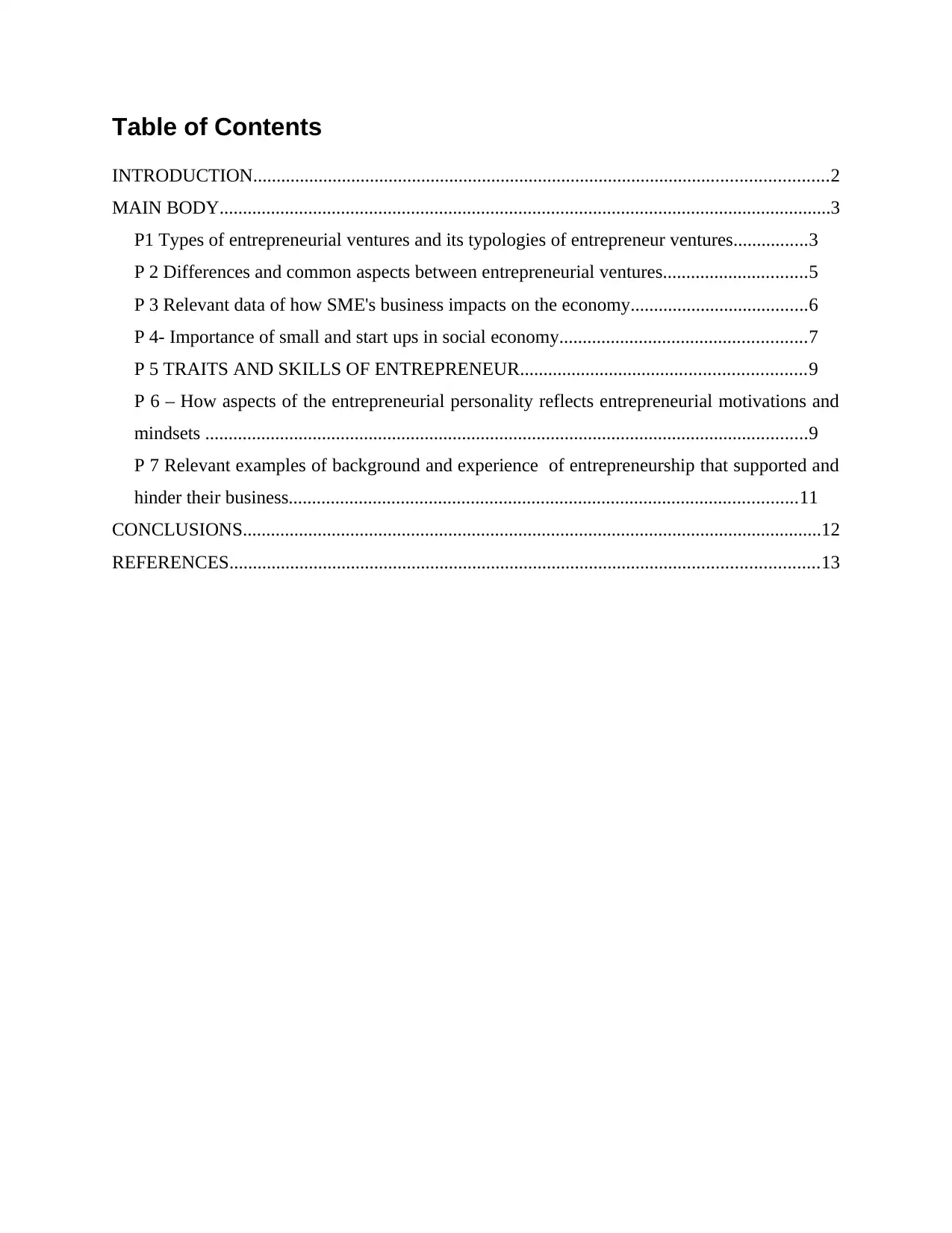
Table of Contents
INTRODUCTION...........................................................................................................................2
MAIN BODY...................................................................................................................................3
P1 Types of entrepreneurial ventures and its typologies of entrepreneur ventures................3
P 2 Differences and common aspects between entrepreneurial ventures...............................5
P 3 Relevant data of how SME's business impacts on the economy......................................6
P 4- Importance of small and start ups in social economy.....................................................7
P 5 TRAITS AND SKILLS OF ENTREPRENEUR.............................................................9
P 6 – How aspects of the entrepreneurial personality reflects entrepreneurial motivations and
mindsets .................................................................................................................................9
P 7 Relevant examples of background and experience of entrepreneurship that supported and
hinder their business.............................................................................................................11
CONCLUSIONS............................................................................................................................12
REFERENCES..............................................................................................................................13
INTRODUCTION...........................................................................................................................2
MAIN BODY...................................................................................................................................3
P1 Types of entrepreneurial ventures and its typologies of entrepreneur ventures................3
P 2 Differences and common aspects between entrepreneurial ventures...............................5
P 3 Relevant data of how SME's business impacts on the economy......................................6
P 4- Importance of small and start ups in social economy.....................................................7
P 5 TRAITS AND SKILLS OF ENTREPRENEUR.............................................................9
P 6 – How aspects of the entrepreneurial personality reflects entrepreneurial motivations and
mindsets .................................................................................................................................9
P 7 Relevant examples of background and experience of entrepreneurship that supported and
hinder their business.............................................................................................................11
CONCLUSIONS............................................................................................................................12
REFERENCES..............................................................................................................................13
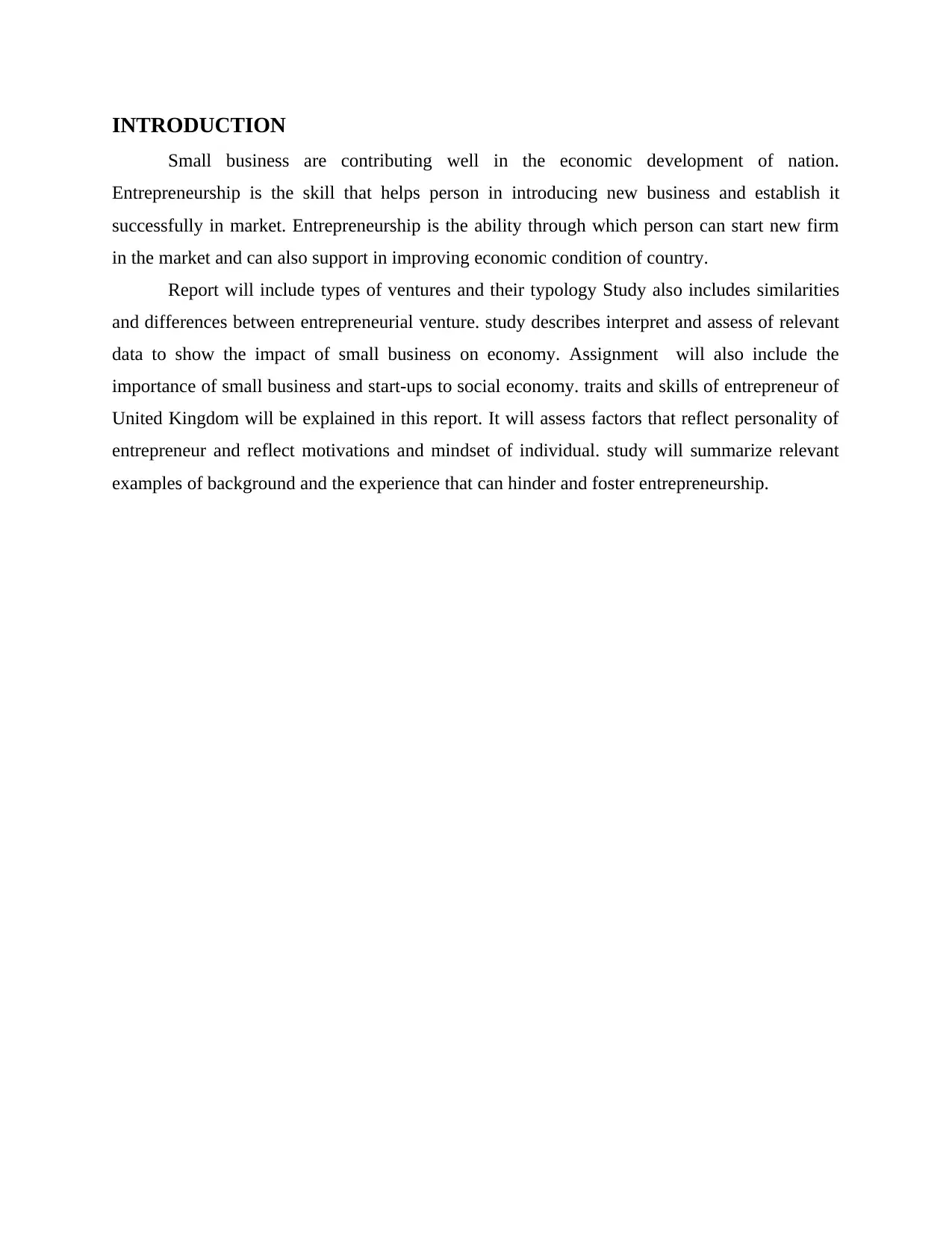
INTRODUCTION
Small business are contributing well in the economic development of nation.
Entrepreneurship is the skill that helps person in introducing new business and establish it
successfully in market. Entrepreneurship is the ability through which person can start new firm
in the market and can also support in improving economic condition of country.
Report will include types of ventures and their typology Study also includes similarities
and differences between entrepreneurial venture. study describes interpret and assess of relevant
data to show the impact of small business on economy. Assignment will also include the
importance of small business and start-ups to social economy. traits and skills of entrepreneur of
United Kingdom will be explained in this report. It will assess factors that reflect personality of
entrepreneur and reflect motivations and mindset of individual. study will summarize relevant
examples of background and the experience that can hinder and foster entrepreneurship.
Small business are contributing well in the economic development of nation.
Entrepreneurship is the skill that helps person in introducing new business and establish it
successfully in market. Entrepreneurship is the ability through which person can start new firm
in the market and can also support in improving economic condition of country.
Report will include types of ventures and their typology Study also includes similarities
and differences between entrepreneurial venture. study describes interpret and assess of relevant
data to show the impact of small business on economy. Assignment will also include the
importance of small business and start-ups to social economy. traits and skills of entrepreneur of
United Kingdom will be explained in this report. It will assess factors that reflect personality of
entrepreneur and reflect motivations and mindset of individual. study will summarize relevant
examples of background and the experience that can hinder and foster entrepreneurship.
⊘ This is a preview!⊘
Do you want full access?
Subscribe today to unlock all pages.

Trusted by 1+ million students worldwide
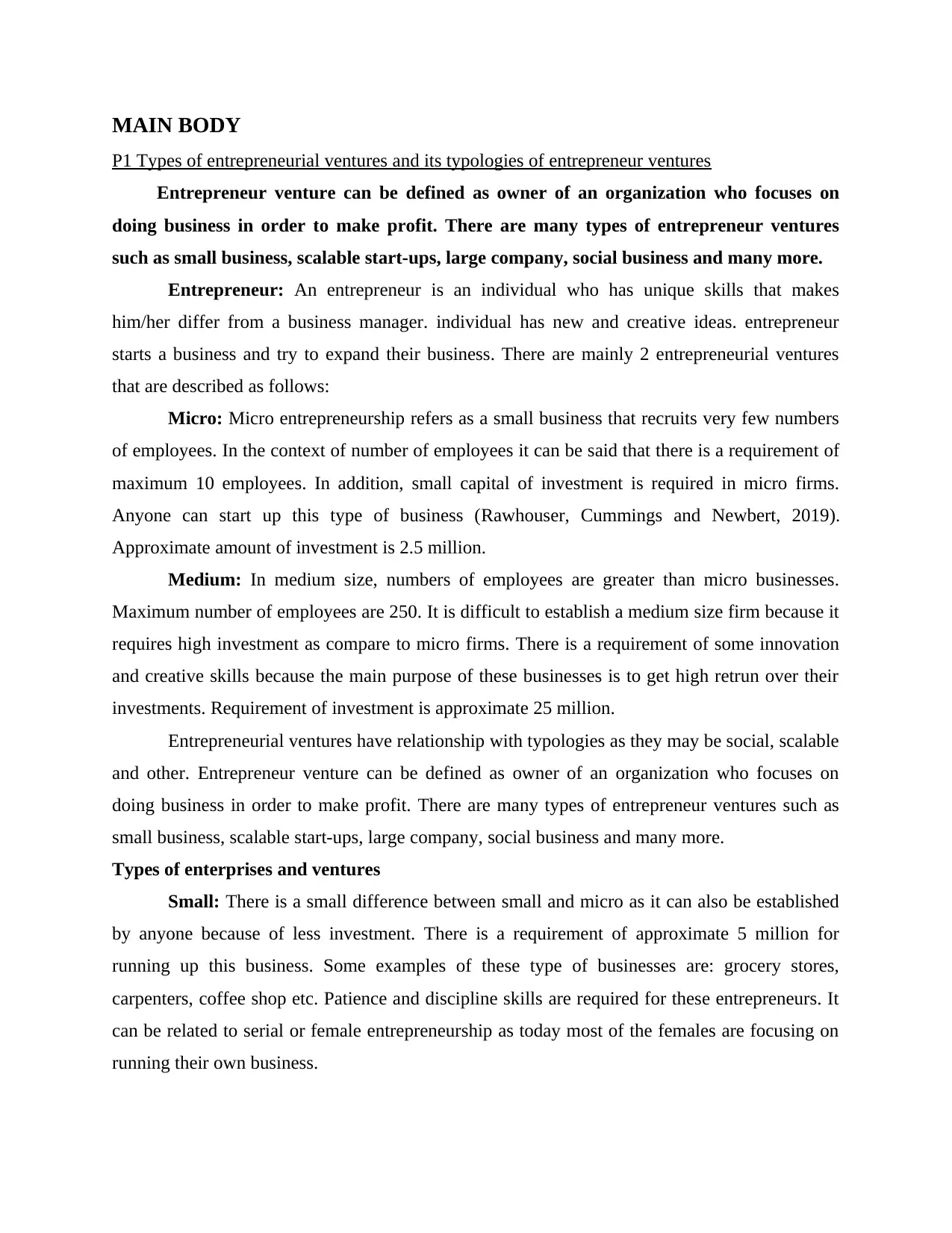
MAIN BODY
P1 Types of entrepreneurial ventures and its typologies of entrepreneur ventures
Entrepreneur venture can be defined as owner of an organization who focuses on
doing business in order to make profit. There are many types of entrepreneur ventures
such as small business, scalable start-ups, large company, social business and many more.
Entrepreneur: An entrepreneur is an individual who has unique skills that makes
him/her differ from a business manager. individual has new and creative ideas. entrepreneur
starts a business and try to expand their business. There are mainly 2 entrepreneurial ventures
that are described as follows:
Micro: Micro entrepreneurship refers as a small business that recruits very few numbers
of employees. In the context of number of employees it can be said that there is a requirement of
maximum 10 employees. In addition, small capital of investment is required in micro firms.
Anyone can start up this type of business (Rawhouser, Cummings and Newbert, 2019).
Approximate amount of investment is 2.5 million.
Medium: In medium size, numbers of employees are greater than micro businesses.
Maximum number of employees are 250. It is difficult to establish a medium size firm because it
requires high investment as compare to micro firms. There is a requirement of some innovation
and creative skills because the main purpose of these businesses is to get high retrun over their
investments. Requirement of investment is approximate 25 million.
Entrepreneurial ventures have relationship with typologies as they may be social, scalable
and other. Entrepreneur venture can be defined as owner of an organization who focuses on
doing business in order to make profit. There are many types of entrepreneur ventures such as
small business, scalable start-ups, large company, social business and many more.
Types of enterprises and ventures
Small: There is a small difference between small and micro as it can also be established
by anyone because of less investment. There is a requirement of approximate 5 million for
running up this business. Some examples of these type of businesses are: grocery stores,
carpenters, coffee shop etc. Patience and discipline skills are required for these entrepreneurs. It
can be related to serial or female entrepreneurship as today most of the females are focusing on
running their own business.
P1 Types of entrepreneurial ventures and its typologies of entrepreneur ventures
Entrepreneur venture can be defined as owner of an organization who focuses on
doing business in order to make profit. There are many types of entrepreneur ventures
such as small business, scalable start-ups, large company, social business and many more.
Entrepreneur: An entrepreneur is an individual who has unique skills that makes
him/her differ from a business manager. individual has new and creative ideas. entrepreneur
starts a business and try to expand their business. There are mainly 2 entrepreneurial ventures
that are described as follows:
Micro: Micro entrepreneurship refers as a small business that recruits very few numbers
of employees. In the context of number of employees it can be said that there is a requirement of
maximum 10 employees. In addition, small capital of investment is required in micro firms.
Anyone can start up this type of business (Rawhouser, Cummings and Newbert, 2019).
Approximate amount of investment is 2.5 million.
Medium: In medium size, numbers of employees are greater than micro businesses.
Maximum number of employees are 250. It is difficult to establish a medium size firm because it
requires high investment as compare to micro firms. There is a requirement of some innovation
and creative skills because the main purpose of these businesses is to get high retrun over their
investments. Requirement of investment is approximate 25 million.
Entrepreneurial ventures have relationship with typologies as they may be social, scalable
and other. Entrepreneur venture can be defined as owner of an organization who focuses on
doing business in order to make profit. There are many types of entrepreneur ventures such as
small business, scalable start-ups, large company, social business and many more.
Types of enterprises and ventures
Small: There is a small difference between small and micro as it can also be established
by anyone because of less investment. There is a requirement of approximate 5 million for
running up this business. Some examples of these type of businesses are: grocery stores,
carpenters, coffee shop etc. Patience and discipline skills are required for these entrepreneurs. It
can be related to serial or female entrepreneurship as today most of the females are focusing on
running their own business.
Paraphrase This Document
Need a fresh take? Get an instant paraphrase of this document with our AI Paraphraser
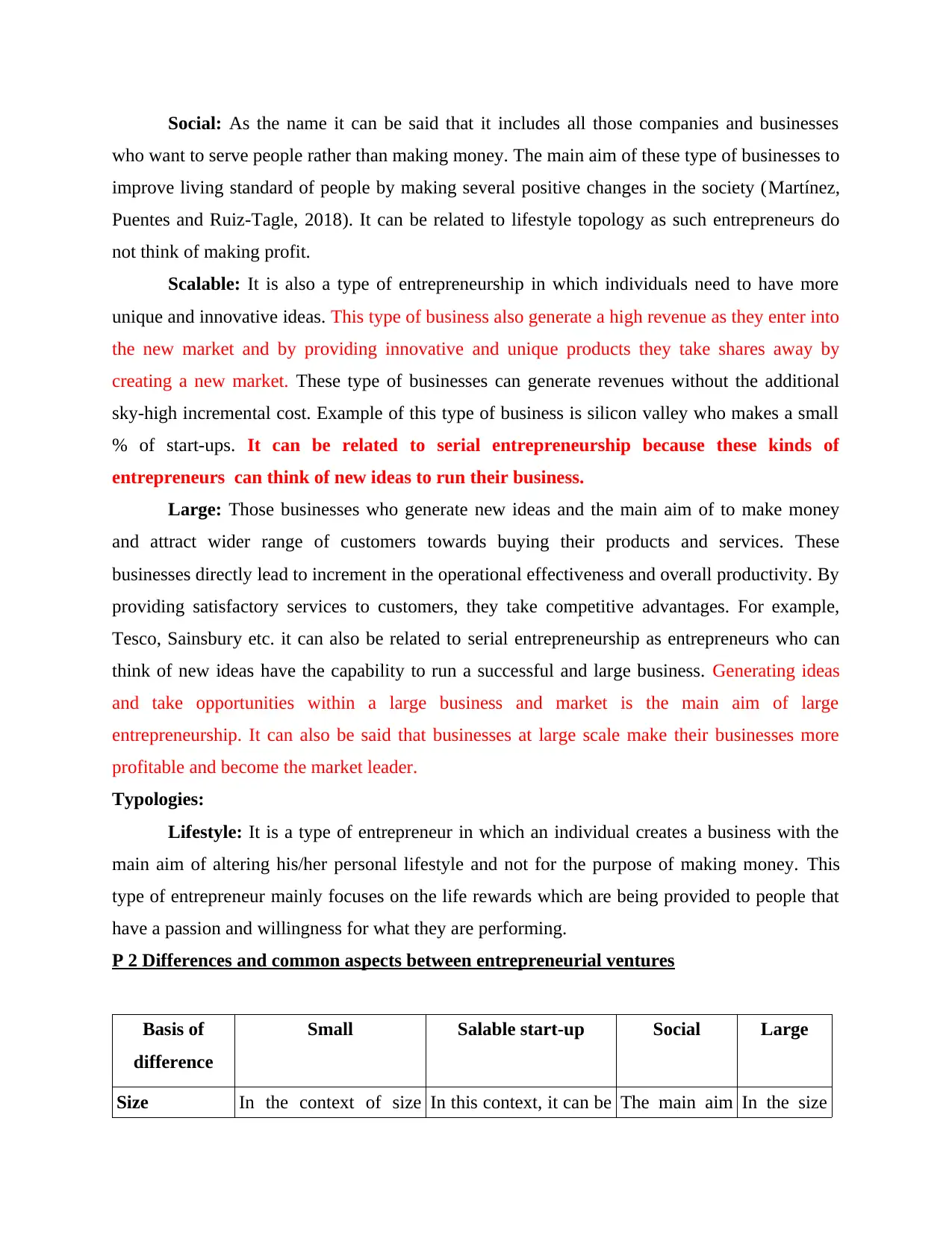
Social: As the name it can be said that it includes all those companies and businesses
who want to serve people rather than making money. The main aim of these type of businesses to
improve living standard of people by making several positive changes in the society (Martínez,
Puentes and Ruiz-Tagle, 2018). It can be related to lifestyle topology as such entrepreneurs do
not think of making profit.
Scalable: It is also a type of entrepreneurship in which individuals need to have more
unique and innovative ideas. This type of business also generate a high revenue as they enter into
the new market and by providing innovative and unique products they take shares away by
creating a new market. These type of businesses can generate revenues without the additional
sky-high incremental cost. Example of this type of business is silicon valley who makes a small
% of start-ups. It can be related to serial entrepreneurship because these kinds of
entrepreneurs can think of new ideas to run their business.
Large: Those businesses who generate new ideas and the main aim of to make money
and attract wider range of customers towards buying their products and services. These
businesses directly lead to increment in the operational effectiveness and overall productivity. By
providing satisfactory services to customers, they take competitive advantages. For example,
Tesco, Sainsbury etc. it can also be related to serial entrepreneurship as entrepreneurs who can
think of new ideas have the capability to run a successful and large business. Generating ideas
and take opportunities within a large business and market is the main aim of large
entrepreneurship. It can also be said that businesses at large scale make their businesses more
profitable and become the market leader.
Typologies:
Lifestyle: It is a type of entrepreneur in which an individual creates a business with the
main aim of altering his/her personal lifestyle and not for the purpose of making money. This
type of entrepreneur mainly focuses on the life rewards which are being provided to people that
have a passion and willingness for what they are performing.
P 2 Differences and common aspects between entrepreneurial ventures
Basis of
difference
Small Salable start-up Social Large
Size In the context of size In this context, it can be The main aim In the size
who want to serve people rather than making money. The main aim of these type of businesses to
improve living standard of people by making several positive changes in the society (Martínez,
Puentes and Ruiz-Tagle, 2018). It can be related to lifestyle topology as such entrepreneurs do
not think of making profit.
Scalable: It is also a type of entrepreneurship in which individuals need to have more
unique and innovative ideas. This type of business also generate a high revenue as they enter into
the new market and by providing innovative and unique products they take shares away by
creating a new market. These type of businesses can generate revenues without the additional
sky-high incremental cost. Example of this type of business is silicon valley who makes a small
% of start-ups. It can be related to serial entrepreneurship because these kinds of
entrepreneurs can think of new ideas to run their business.
Large: Those businesses who generate new ideas and the main aim of to make money
and attract wider range of customers towards buying their products and services. These
businesses directly lead to increment in the operational effectiveness and overall productivity. By
providing satisfactory services to customers, they take competitive advantages. For example,
Tesco, Sainsbury etc. it can also be related to serial entrepreneurship as entrepreneurs who can
think of new ideas have the capability to run a successful and large business. Generating ideas
and take opportunities within a large business and market is the main aim of large
entrepreneurship. It can also be said that businesses at large scale make their businesses more
profitable and become the market leader.
Typologies:
Lifestyle: It is a type of entrepreneur in which an individual creates a business with the
main aim of altering his/her personal lifestyle and not for the purpose of making money. This
type of entrepreneur mainly focuses on the life rewards which are being provided to people that
have a passion and willingness for what they are performing.
P 2 Differences and common aspects between entrepreneurial ventures
Basis of
difference
Small Salable start-up Social Large
Size In the context of size In this context, it can be The main aim In the size
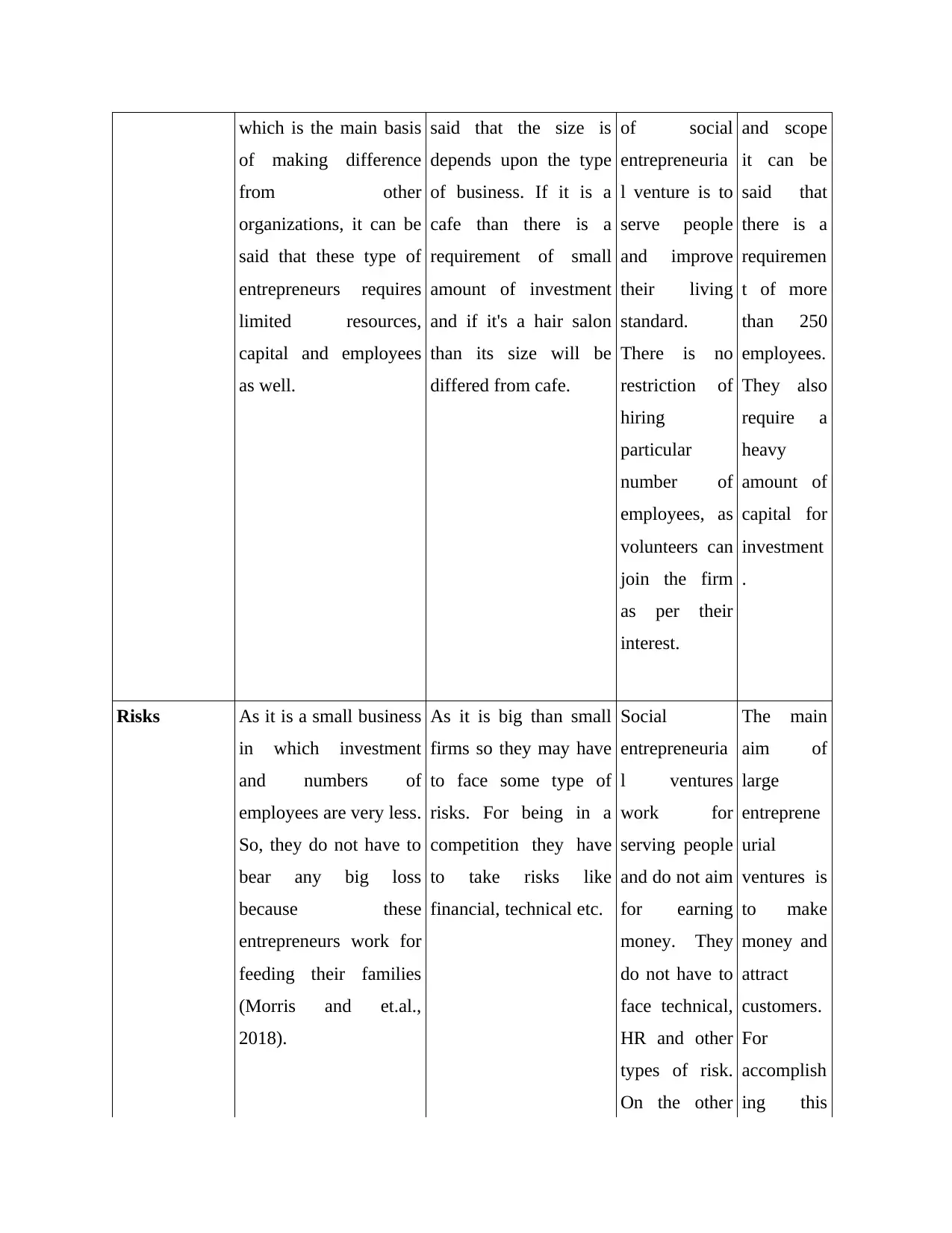
which is the main basis
of making difference
from other
organizations, it can be
said that these type of
entrepreneurs requires
limited resources,
capital and employees
as well.
said that the size is
depends upon the type
of business. If it is a
cafe than there is a
requirement of small
amount of investment
and if it's a hair salon
than its size will be
differed from cafe.
of social
entrepreneuria
l venture is to
serve people
and improve
their living
standard.
There is no
restriction of
hiring
particular
number of
employees, as
volunteers can
join the firm
as per their
interest.
and scope
it can be
said that
there is a
requiremen
t of more
than 250
employees.
They also
require a
heavy
amount of
capital for
investment
.
Risks As it is a small business
in which investment
and numbers of
employees are very less.
So, they do not have to
bear any big loss
because these
entrepreneurs work for
feeding their families
(Morris and et.al.,
2018).
As it is big than small
firms so they may have
to face some type of
risks. For being in a
competition they have
to take risks like
financial, technical etc.
Social
entrepreneuria
l ventures
work for
serving people
and do not aim
for earning
money. They
do not have to
face technical,
HR and other
types of risk.
On the other
The main
aim of
large
entreprene
urial
ventures is
to make
money and
attract
customers.
For
accomplish
ing this
of making difference
from other
organizations, it can be
said that these type of
entrepreneurs requires
limited resources,
capital and employees
as well.
said that the size is
depends upon the type
of business. If it is a
cafe than there is a
requirement of small
amount of investment
and if it's a hair salon
than its size will be
differed from cafe.
of social
entrepreneuria
l venture is to
serve people
and improve
their living
standard.
There is no
restriction of
hiring
particular
number of
employees, as
volunteers can
join the firm
as per their
interest.
and scope
it can be
said that
there is a
requiremen
t of more
than 250
employees.
They also
require a
heavy
amount of
capital for
investment
.
Risks As it is a small business
in which investment
and numbers of
employees are very less.
So, they do not have to
bear any big loss
because these
entrepreneurs work for
feeding their families
(Morris and et.al.,
2018).
As it is big than small
firms so they may have
to face some type of
risks. For being in a
competition they have
to take risks like
financial, technical etc.
Social
entrepreneuria
l ventures
work for
serving people
and do not aim
for earning
money. They
do not have to
face technical,
HR and other
types of risk.
On the other
The main
aim of
large
entreprene
urial
ventures is
to make
money and
attract
customers.
For
accomplish
ing this
⊘ This is a preview!⊘
Do you want full access?
Subscribe today to unlock all pages.

Trusted by 1+ million students worldwide

hand there are
some internal
and external
factors that
can create
some risks
like:
discrimination,
ineffective
policy etc.
aim they
take
several
risks and
sometimes
they have
to face the
problem of
reputation
risks,
operational
risks,
financial
instability
risks etc.
Structure Such type of
organizations have no
proper structure.
They can have either
partnership or corporate
structure.
Most of the
organization in
this are trustee
based
organizations
They have
a complex
structure
which
completely
depends
upon
company
type.
Employees Not more than 50 Depends upon the
company size
Depends upon
the company
size
More than
1000
Similarities in small, medium and large businesses are:
some internal
and external
factors that
can create
some risks
like:
discrimination,
ineffective
policy etc.
aim they
take
several
risks and
sometimes
they have
to face the
problem of
reputation
risks,
operational
risks,
financial
instability
risks etc.
Structure Such type of
organizations have no
proper structure.
They can have either
partnership or corporate
structure.
Most of the
organization in
this are trustee
based
organizations
They have
a complex
structure
which
completely
depends
upon
company
type.
Employees Not more than 50 Depends upon the
company size
Depends upon
the company
size
More than
1000
Similarities in small, medium and large businesses are:
Paraphrase This Document
Need a fresh take? Get an instant paraphrase of this document with our AI Paraphraser
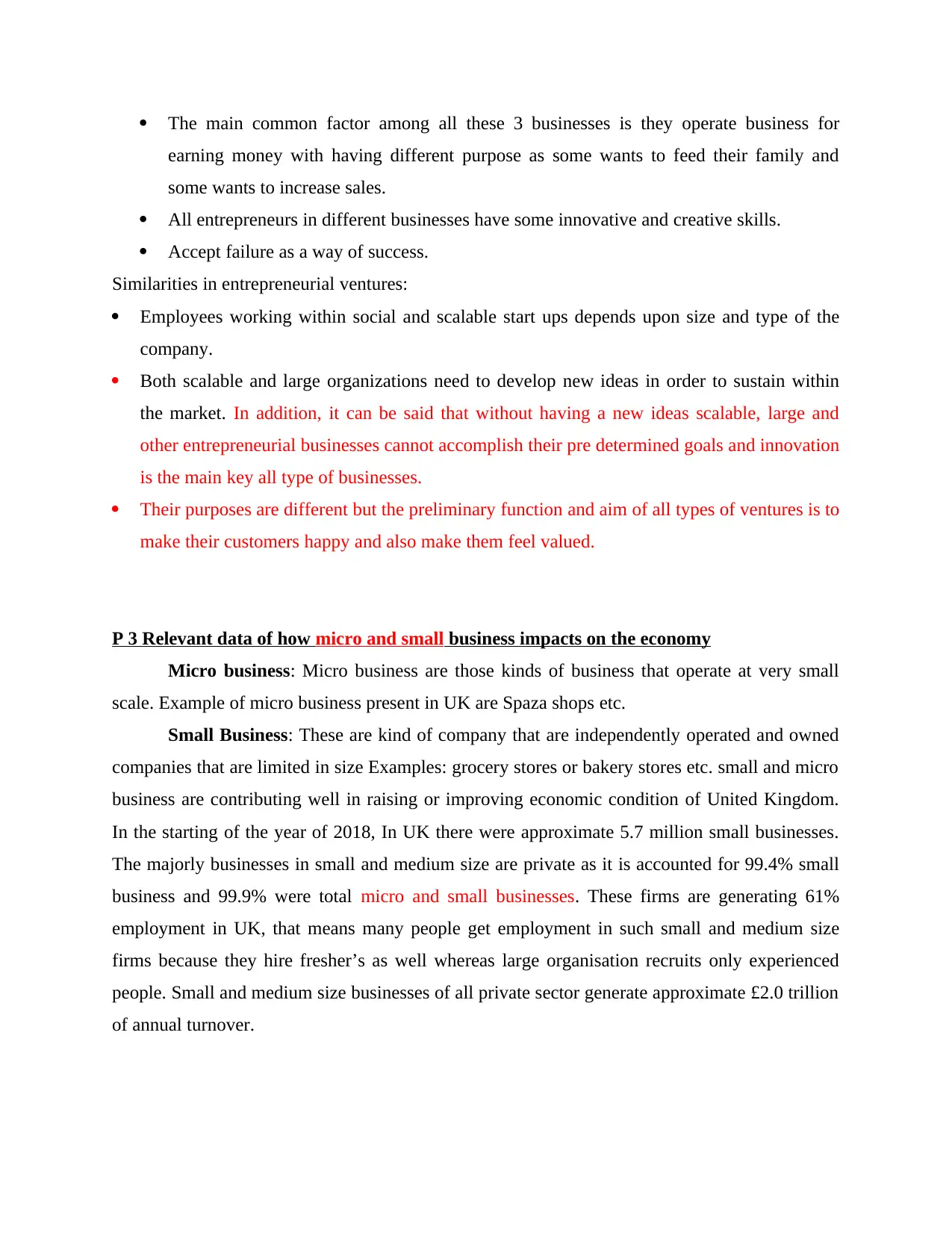
The main common factor among all these 3 businesses is they operate business for
earning money with having different purpose as some wants to feed their family and
some wants to increase sales.
All entrepreneurs in different businesses have some innovative and creative skills.
Accept failure as a way of success.
Similarities in entrepreneurial ventures:
Employees working within social and scalable start ups depends upon size and type of the
company.
Both scalable and large organizations need to develop new ideas in order to sustain within
the market. In addition, it can be said that without having a new ideas scalable, large and
other entrepreneurial businesses cannot accomplish their pre determined goals and innovation
is the main key all type of businesses.
Their purposes are different but the preliminary function and aim of all types of ventures is to
make their customers happy and also make them feel valued.
P 3 Relevant data of how micro and small business impacts on the economy
Micro business: Micro business are those kinds of business that operate at very small
scale. Example of micro business present in UK are Spaza shops etc.
Small Business: These are kind of company that are independently operated and owned
companies that are limited in size Examples: grocery stores or bakery stores etc. small and micro
business are contributing well in raising or improving economic condition of United Kingdom.
In the starting of the year of 2018, In UK there were approximate 5.7 million small businesses.
The majorly businesses in small and medium size are private as it is accounted for 99.4% small
business and 99.9% were total micro and small businesses. These firms are generating 61%
employment in UK, that means many people get employment in such small and medium size
firms because they hire fresher’s as well whereas large organisation recruits only experienced
people. Small and medium size businesses of all private sector generate approximate £2.0 trillion
of annual turnover.
earning money with having different purpose as some wants to feed their family and
some wants to increase sales.
All entrepreneurs in different businesses have some innovative and creative skills.
Accept failure as a way of success.
Similarities in entrepreneurial ventures:
Employees working within social and scalable start ups depends upon size and type of the
company.
Both scalable and large organizations need to develop new ideas in order to sustain within
the market. In addition, it can be said that without having a new ideas scalable, large and
other entrepreneurial businesses cannot accomplish their pre determined goals and innovation
is the main key all type of businesses.
Their purposes are different but the preliminary function and aim of all types of ventures is to
make their customers happy and also make them feel valued.
P 3 Relevant data of how micro and small business impacts on the economy
Micro business: Micro business are those kinds of business that operate at very small
scale. Example of micro business present in UK are Spaza shops etc.
Small Business: These are kind of company that are independently operated and owned
companies that are limited in size Examples: grocery stores or bakery stores etc. small and micro
business are contributing well in raising or improving economic condition of United Kingdom.
In the starting of the year of 2018, In UK there were approximate 5.7 million small businesses.
The majorly businesses in small and medium size are private as it is accounted for 99.4% small
business and 99.9% were total micro and small businesses. These firms are generating 61%
employment in UK, that means many people get employment in such small and medium size
firms because they hire fresher’s as well whereas large organisation recruits only experienced
people. Small and medium size businesses of all private sector generate approximate £2.0 trillion
of annual turnover.
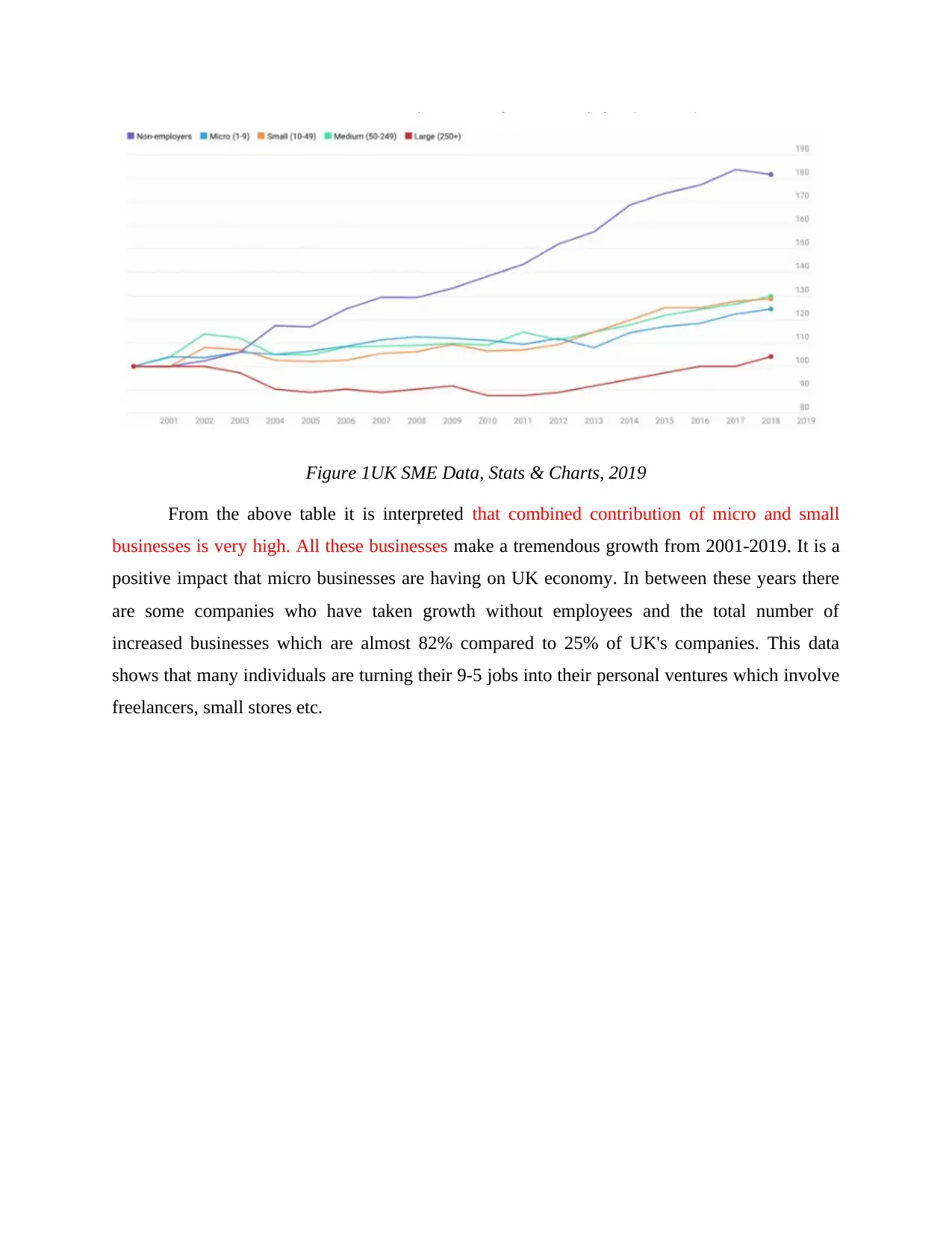
Figure 1UK SME Data, Stats & Charts, 2019
From the above table it is interpreted that combined contribution of micro and small
businesses is very high. All these businesses make a tremendous growth from 2001-2019. It is a
positive impact that micro businesses are having on UK economy. In between these years there
are some companies who have taken growth without employees and the total number of
increased businesses which are almost 82% compared to 25% of UK's companies. This data
shows that many individuals are turning their 9-5 jobs into their personal ventures which involve
freelancers, small stores etc.
From the above table it is interpreted that combined contribution of micro and small
businesses is very high. All these businesses make a tremendous growth from 2001-2019. It is a
positive impact that micro businesses are having on UK economy. In between these years there
are some companies who have taken growth without employees and the total number of
increased businesses which are almost 82% compared to 25% of UK's companies. This data
shows that many individuals are turning their 9-5 jobs into their personal ventures which involve
freelancers, small stores etc.
⊘ This is a preview!⊘
Do you want full access?
Subscribe today to unlock all pages.

Trusted by 1+ million students worldwide

Figure 2UK micro and sall Data, Stats & Charts, 2019
In the UK, there are approximate 1,059 businesses at the rate of per 10,000 residents and
are some other regions that are above the UK region such as: The south East, The South West
and East of England. UK is a very broad service sector as 75% of UK businesses are from
service sector. In the context of average turnover of micro and small's is less than £25M that
makes up of approximate £8,000 profit per year. It does not only generate UK economy but also
contribute in nation economy by giving financial stability and support.
In the UK, there are approximate 1,059 businesses at the rate of per 10,000 residents and
are some other regions that are above the UK region such as: The south East, The South West
and East of England. UK is a very broad service sector as 75% of UK businesses are from
service sector. In the context of average turnover of micro and small's is less than £25M that
makes up of approximate £8,000 profit per year. It does not only generate UK economy but also
contribute in nation economy by giving financial stability and support.
Paraphrase This Document
Need a fresh take? Get an instant paraphrase of this document with our AI Paraphraser

(Figure 3UK SME Data, Stats & Charts, 2019)
P 4- Importance of small and start ups in social economy
Social economy can be defined as rich diversity of enterprises or organizations that share
common values and features like democratic governance, voluntary and open memberships etc.
The social economy organizations and enterprises are classified into different sizes which
are ranged from the small medium enterprises to the large organizations which are earning huge
profit in the organization.
There are 4 pillars of social economy such as:
Mutuals: Mutuals can be defined as an enterprise which provides life as well as non-life
services and social security schemes. The preliminary aim of mutuals is to satisfy common and
basic needs of people. Example: Friendly societies of the UK.
Foundations: A foundation is an association which also works for social purpose and
improving living standards of people. A reasonable consideration of human rights is known as
the foundation of social conduct. Example: European Foundation Center which has around
7,500 grant-making trusts and foundations in the UK.
P 4- Importance of small and start ups in social economy
Social economy can be defined as rich diversity of enterprises or organizations that share
common values and features like democratic governance, voluntary and open memberships etc.
The social economy organizations and enterprises are classified into different sizes which
are ranged from the small medium enterprises to the large organizations which are earning huge
profit in the organization.
There are 4 pillars of social economy such as:
Mutuals: Mutuals can be defined as an enterprise which provides life as well as non-life
services and social security schemes. The preliminary aim of mutuals is to satisfy common and
basic needs of people. Example: Friendly societies of the UK.
Foundations: A foundation is an association which also works for social purpose and
improving living standards of people. A reasonable consideration of human rights is known as
the foundation of social conduct. Example: European Foundation Center which has around
7,500 grant-making trusts and foundations in the UK.
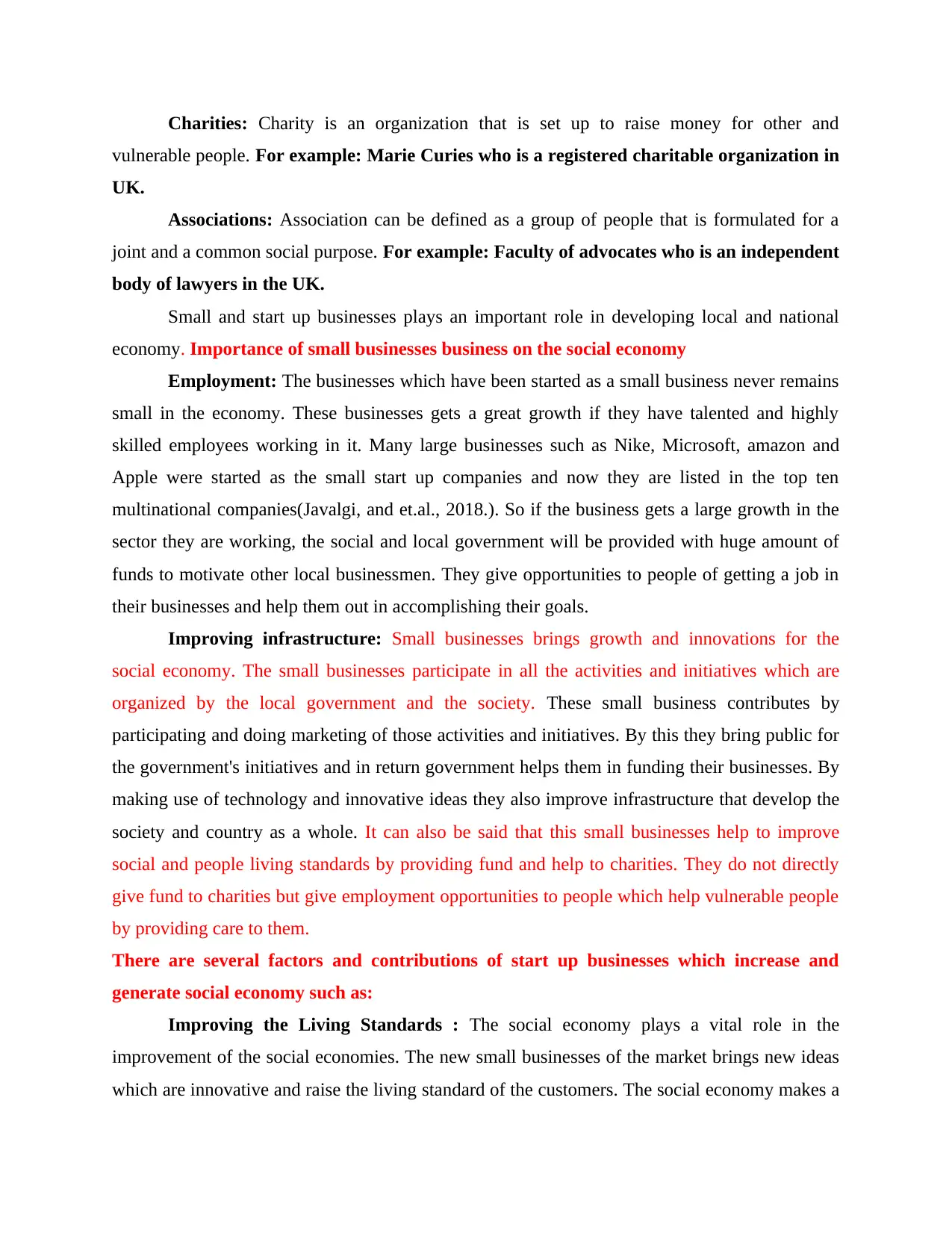
Charities: Charity is an organization that is set up to raise money for other and
vulnerable people. For example: Marie Curies who is a registered charitable organization in
UK.
Associations: Association can be defined as a group of people that is formulated for a
joint and a common social purpose. For example: Faculty of advocates who is an independent
body of lawyers in the UK.
Small and start up businesses plays an important role in developing local and national
economy. Importance of small businesses business on the social economy
Employment: The businesses which have been started as a small business never remains
small in the economy. These businesses gets a great growth if they have talented and highly
skilled employees working in it. Many large businesses such as Nike, Microsoft, amazon and
Apple were started as the small start up companies and now they are listed in the top ten
multinational companies(Javalgi, and et.al., 2018.). So if the business gets a large growth in the
sector they are working, the social and local government will be provided with huge amount of
funds to motivate other local businessmen. They give opportunities to people of getting a job in
their businesses and help them out in accomplishing their goals.
Improving infrastructure: Small businesses brings growth and innovations for the
social economy. The small businesses participate in all the activities and initiatives which are
organized by the local government and the society. These small business contributes by
participating and doing marketing of those activities and initiatives. By this they bring public for
the government's initiatives and in return government helps them in funding their businesses. By
making use of technology and innovative ideas they also improve infrastructure that develop the
society and country as a whole. It can also be said that this small businesses help to improve
social and people living standards by providing fund and help to charities. They do not directly
give fund to charities but give employment opportunities to people which help vulnerable people
by providing care to them.
There are several factors and contributions of start up businesses which increase and
generate social economy such as:
Improving the Living Standards : The social economy plays a vital role in the
improvement of the social economies. The new small businesses of the market brings new ideas
which are innovative and raise the living standard of the customers. The social economy makes a
vulnerable people. For example: Marie Curies who is a registered charitable organization in
UK.
Associations: Association can be defined as a group of people that is formulated for a
joint and a common social purpose. For example: Faculty of advocates who is an independent
body of lawyers in the UK.
Small and start up businesses plays an important role in developing local and national
economy. Importance of small businesses business on the social economy
Employment: The businesses which have been started as a small business never remains
small in the economy. These businesses gets a great growth if they have talented and highly
skilled employees working in it. Many large businesses such as Nike, Microsoft, amazon and
Apple were started as the small start up companies and now they are listed in the top ten
multinational companies(Javalgi, and et.al., 2018.). So if the business gets a large growth in the
sector they are working, the social and local government will be provided with huge amount of
funds to motivate other local businessmen. They give opportunities to people of getting a job in
their businesses and help them out in accomplishing their goals.
Improving infrastructure: Small businesses brings growth and innovations for the
social economy. The small businesses participate in all the activities and initiatives which are
organized by the local government and the society. These small business contributes by
participating and doing marketing of those activities and initiatives. By this they bring public for
the government's initiatives and in return government helps them in funding their businesses. By
making use of technology and innovative ideas they also improve infrastructure that develop the
society and country as a whole. It can also be said that this small businesses help to improve
social and people living standards by providing fund and help to charities. They do not directly
give fund to charities but give employment opportunities to people which help vulnerable people
by providing care to them.
There are several factors and contributions of start up businesses which increase and
generate social economy such as:
Improving the Living Standards : The social economy plays a vital role in the
improvement of the social economies. The new small businesses of the market brings new ideas
which are innovative and raise the living standard of the customers. The social economy makes a
⊘ This is a preview!⊘
Do you want full access?
Subscribe today to unlock all pages.

Trusted by 1+ million students worldwide
1 out of 20
Related Documents
Your All-in-One AI-Powered Toolkit for Academic Success.
+13062052269
info@desklib.com
Available 24*7 on WhatsApp / Email
![[object Object]](/_next/static/media/star-bottom.7253800d.svg)
Unlock your academic potential
Copyright © 2020–2026 A2Z Services. All Rights Reserved. Developed and managed by ZUCOL.





